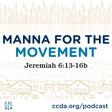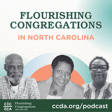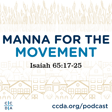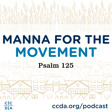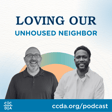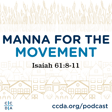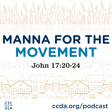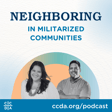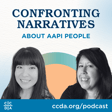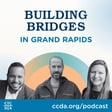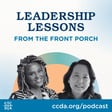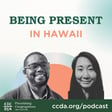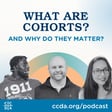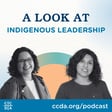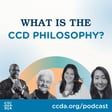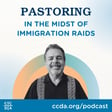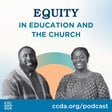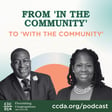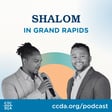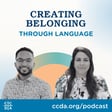Become a Creator today!Start creating today - Share your story with the world!
Start for free
00:00:00
00:00:01

A Theology From The Border
Recommended
Transcript
Theology from the Border
00:00:05
Speaker
And welcome to the CCDA podcast.
00:00:09
Speaker
In this episode, Bethany Rivera Molinar talks to us about a theology from the border taken from the 2020 conference.
00:00:16
Speaker
We join her now in her workshop.
00:00:19
Speaker
So none of us come to scripture with a blank slate and interpreting, understanding and applying it.
00:00:26
Speaker
Rather, we see scripture, we understand scripture, we apply scripture through the lenses in which we we see the world through.
00:00:34
Speaker
Right.
00:00:35
Speaker
We understand, we read scripture through the lens of our gender.
00:00:38
Speaker
We read and understand scripture through our culture, through our heritage, through the way we were raised, maybe the relationship we have with our parents.
00:00:50
Speaker
All of these things and more shape how we come to scripture and interpreting, understanding what we focus on, how we apply it.
00:00:58
Speaker
scripture.
Power and Scripture Interpretation
00:00:59
Speaker
One of the ways that we, one of the lenses that many of us and a lens that's prominent throughout history is one that is pointed out to us by Miguel de la Torre in his book, Doing Christian Ethics from the Margins.
00:01:14
Speaker
And in that book, he talks about the fact that the way that we have been taught to understand and interpret scripture historically and even on into today has largely been to protect those in power.
00:01:26
Speaker
So that can seem like a very strong, a very big statement.
00:01:29
Speaker
What do you mean?
00:01:31
Speaker
You mean I don't come to scripture and not see and not protect those in power?
00:01:36
Speaker
Like, I don't understand what that means.
00:01:38
Speaker
Let me give you a couple of examples of what that looks like.
00:01:40
Speaker
So Matthew chapter 19 is the story of the rich young ruler, right?
00:01:44
Speaker
So this rich young ruler comes to Jesus and he says, what do I need to do to inherit the kingdom of heaven, to have eternal life?
00:01:50
Speaker
And Jesus has dialogue with him.
00:01:52
Speaker
They kind of tick off.
00:01:53
Speaker
Okay, I'm doing this.
00:01:54
Speaker
I'm doing that.
00:01:54
Speaker
I'm doing all these things.
00:01:55
Speaker
And Jesus says, there's one thing you lack.
00:01:57
Speaker
You need to give everything away you have to the poor and then come follow me and then your reward will be great.
00:02:03
Speaker
And then the story tells us that the rich young ruler leaves sad because he had a lot.
00:02:08
Speaker
And so Jesus turns to his disciples and he says, it is easier for a camel to go through the eye of a needle than for a rich man to enter through the kingdom of heaven.
00:02:17
Speaker
Um, as I, when I grew up in, in church and even on into seminary, uh, the way that I was taught to interpret and understand that scripture was to say, was to, to place less emphasis on the fact that God asked this man, a rich man to give away all that he had.
00:02:34
Speaker
Um, and it was shied away from seeing that as a, something that we should, that everybody with wealth should consider.
00:02:40
Speaker
Right.
00:02:40
Speaker
Uh, it was said, well, that will, that was that young man's
00:02:44
Speaker
issue that was his sin.
00:02:46
Speaker
And so for him, it was wealth, but not if that's not the case for every wealthy person, right?
00:02:51
Speaker
So it was massaged.
00:02:51
Speaker
It was made more palatable to wealthy ears.
00:02:54
Speaker
Wealthy people tend to be more in power, have more power, right?
00:02:58
Speaker
And so
Migration in God's Story
00:02:59
Speaker
the other scripture where you can see this happen is in one of an example is Romans 13.
00:03:06
Speaker
And so that's a scripture that we hear a lot on the border that's kind of crammed down our throat and says, you have to obey it verbatim, right?
00:03:13
Speaker
So that scripture says, let every person be subject to governing authorities for there is no authority except that which God has been given.
00:03:20
Speaker
We are instructed to interpret and understand that verbatim.
00:03:24
Speaker
So it doesn't matter what's happening.
00:03:25
Speaker
It doesn't matter the fact that,
00:03:28
Speaker
It feels that a tyrant is running the show and directly affecting lives on our border and amongst other places.
00:03:37
Speaker
We are told that that person was placed in power.
00:03:39
Speaker
Those people are placed in power.
00:03:41
Speaker
So you have to respect and you have to submit to their authority, right?
00:03:46
Speaker
This lens of scripture, understanding this,
00:03:50
Speaker
the awareness that this is how we've been taught throughout history, throughout many of our cultures to understand scripture so that people are kept in power, can prevent us from seeing the critical role that migration plays in scripture, right?
00:04:06
Speaker
So Dr. D.G.
00:04:09
Speaker
Grudy, he's a theologian of migration and he says this, the identity of the people of God is inextricably tied with the story of movement, risk, and hospitality.
00:04:18
Speaker
So what D.G.
00:04:19
Speaker
Grudy is telling us is that you cannot have the story of God without the story of and the story of God and man without the story of migration.
00:04:27
Speaker
It's an integral part of how God chose to reveal himself through scripture.
00:04:34
Speaker
And.
00:04:37
Speaker
I think about a professor in my seminary that said scripture was like a jewel.
00:04:43
Speaker
So there's many facets in a jewel, right?
00:04:46
Speaker
And so sometimes we're just used to looking at it from this certain lens
00:04:50
Speaker
And so what I want to do today is to take some scriptures, talk to you about some scriptures that maybe you have heard before, or maybe that you have breezed over before, two specific instances where God directly has something to say to us about migration and what it means and what our call is to migrants.
00:05:10
Speaker
But before
Old Testament and Migrant Care
00:05:11
Speaker
that, I want to preface by saying this is not at all exhaustive.
00:05:14
Speaker
Scripture is littered with stories of migrants from Adam and Eve to the first early church who was made and through the gospel spread through communities of immigrants.
00:05:29
Speaker
Also, I want to say that scripture...
00:05:32
Speaker
not only has stories of migrants, but there is legislation in the Old Testament, extensive legislation that specifically speaks to how we are called to treat people that are not from this land.
00:05:44
Speaker
And so I encourage you to look at those scriptures, to read them, to look into it.
00:05:49
Speaker
But God definitely has a lot to say about migration.
00:05:52
Speaker
So I'm going to talk today about two specific stories.
00:05:55
Speaker
And, um, and then, and then kind of, again, turn this, this, the jewel of scripture, ask the Holy spirit to maybe reveal to us some things that we've missed because of the lenses maybe that have prevented us from seeing what God's speaking to us about immigration and migrants.
00:06:12
Speaker
Hi, my name is Christina for, and what I love about CCDA is that our faith is part of communities flourishing.
00:06:20
Speaker
Welcome to the CCDA podcast.
00:06:25
Speaker
The first story I want to talk about is the story of Ruth.
00:06:28
Speaker
Ruth was not originally an immigrant, right?
00:06:29
Speaker
In the beginning of the story, she married an immigrant who came into her land.
00:06:34
Speaker
But what happens?
00:06:34
Speaker
Her husband is killed.
00:06:36
Speaker
We don't, um, his, her father-in-law is killed.
00:06:39
Speaker
Her brother-in-law is killed.
00:06:40
Speaker
Brothers-in-law.
00:06:42
Speaker
Um,
00:06:43
Speaker
And they, it's just her and her sister-in-law, sisters-in-law and her mother-in-law and her sisters-in-law go back to their land and try to live life.
00:06:53
Speaker
But Ruth makes the bold and courageous decision to follow her mother-in-law back into her mother-in-law's native land.
00:07:01
Speaker
This is a courageous decision.
00:07:03
Speaker
It's a decision of great valor because as migrants are incredibly vulnerable, both in scripture and even on to today.
00:07:12
Speaker
Sometimes we think about people migrating, we don't stop to say or think and reflect on what it takes for somebody to leave their language, their culture.
00:07:21
Speaker
in some cases their faith, their family, everything that's familiar to them to go to another place.
00:07:27
Speaker
What does it take for a person to make that decision?
00:07:31
Speaker
Migration is an act of valor.
00:07:34
Speaker
For Ruth, this was certainly an act of valor.
00:07:37
Speaker
She followed her mother-in-law.
00:07:39
Speaker
She traveled, which was where she was very vulnerable, into a land where she didn't know anybody.
00:07:43
Speaker
She didn't know any person.
00:07:45
Speaker
It's not her native culture.
00:07:47
Speaker
So what happens is she goes into the field of Boaz.
00:07:50
Speaker
Her mother-in-law sends her there so that they can survive to glean the fields.
00:07:54
Speaker
And what happens is Boaz sees her in the fields, right?
00:07:58
Speaker
And he asks somebody, who's that woman?
00:08:00
Speaker
When I...
00:08:01
Speaker
I've heard this scripture since I was a kid and I always assumed, oh, Ruth must have, she just must have been so beautiful.
00:08:07
Speaker
Like, of course he noticed her.
00:08:08
Speaker
There's just some type of charisma about her.
00:08:11
Speaker
She has that uncertain, unspoken quality, just beautiful woman.
00:08:16
Speaker
But I never stopped to think the fact that she's an immigrant, right?
00:08:18
Speaker
So what does an immigrant mean?
00:08:20
Speaker
It means that you look different maybe from the culture that you're in.
00:08:23
Speaker
maybe you sound different maybe you don't speak the language so your language is broken your speech is broken maybe the clothing you're wearing looks different than the culture that you're in so she stood out and what happens is Boaz hears the story of this Moabite woman because the the person that tells the story doesn't even say oh that's Ruth the Moabite woman he just says that's that Moabite woman that followed Naomi
00:08:48
Speaker
And he's struck by her story.
00:08:50
Speaker
He invites her to come and eat with him.
00:08:54
Speaker
And what he does after he spends time with her is he tells his men, do not molest her, do not abuse her.
00:09:01
Speaker
She is under my protection.
00:09:03
Speaker
I don't want any harm to come to her, right?
00:09:04
Speaker
And then he also gives her extra bales of food, extra parcels of food to take with her.
00:09:10
Speaker
The thing about this story is he's doing something that's illegal according to biblical law, right?
00:09:15
Speaker
So he is helping an immigrant that is seen as his acts are unlawful according to who she is.
00:09:25
Speaker
So those scripture, and I mentioned it, is littered with exhortation after exhortation, particularly in the Old Testament, about how to care for people that are not from the land that you're in, for the foreigner.
00:09:37
Speaker
There is scripture, and it's thus saith the Lord type scripture in Deuteronomy 23, verses 4 through 6.
00:09:43
Speaker
where the Israelites are specifically instructed not to seek the peace or prosperity of the Moabites.
00:09:50
Speaker
It says, do not seek their peace, do not seek their prosperity, thus saith the Lord, right?
00:09:55
Speaker
What does Boaz do in this situation?
00:09:57
Speaker
We haven't even gotten to the part where they get married.
00:09:59
Speaker
Just this part of the story, he acts unlawfully, right?
00:10:03
Speaker
He...
00:10:05
Speaker
seeks her peace, right?
00:10:06
Speaker
Because he tells his men to protect her and not to harm her.
00:10:10
Speaker
And he seeks her prosperity, not just by allowing her to just get by by gleaning, but giving her extra.
00:10:15
Speaker
And then eventually he marries her, right?
00:10:18
Speaker
So this story is a story that where,
00:10:21
Speaker
It seems like scripture is saying two different things.
00:10:24
Speaker
And so when scripture says two different things, we have to look at the thread that is woven through scripture.
00:10:29
Speaker
What is the primary, the main threads that God is trying to speak it to us through?
00:10:34
Speaker
Well, I can tell you that in the Old Testament, the first, the command that's most often repeated to the people is to hear, oh Lord, our God, that God is one.
00:10:44
Speaker
But the second one is a consistent exhortation to care for the migrant.
00:10:51
Speaker
And for the vulnerable as well.
00:10:52
Speaker
But in this case, the second most repeated command in the Old Testament is to care for the stranger, for the foreigner.
00:11:01
Speaker
And we see this evidence in Christ's words when Christ himself is asked that question, like, how do we distill all of this?
00:11:08
Speaker
What is the greatest commandment?
00:11:09
Speaker
I feel like I have all these things I need to obey.
00:11:11
Speaker
What are the greatest commandments?
00:11:13
Speaker
And Jesus says, the greatest commandment is to love the Lord your God with all your heart, your soul, your mind, your strength.
00:11:18
Speaker
And the second is like this, to love your neighbor as yourself, right?
00:11:23
Speaker
So the story of Ruth is a story of a courageous immigrant who migrates to care for somebody that she cares for very deeply.
00:11:30
Speaker
And I think that has a lot to speak to us today in terms of how we understand scripture, how we understand migrants and how we understand the story of migrants and the motivations for their travels and what it takes for somebody to go from one place to another.
00:11:44
Speaker
We'll
We Raise Foundation's Mission
00:11:45
Speaker
be right back.
00:11:46
Speaker
But first, a word from our sponsor.
00:11:48
Speaker
Hello, I'm Paul Miles, President and CEO of We Raise Foundation.
00:11:52
Speaker
We Raise invests in people and organizations that serve at the intersection of poverty, violence, and inequality.
00:11:59
Speaker
We start by acknowledging that change begins with we.
00:12:02
Speaker
We are in this together.
00:12:04
Speaker
And it's going to take our love and our compassion and dedication to solve the problems facing communities today.
00:12:11
Speaker
We invite you to be part of that with us and encourage you to visit WeRaise.org to find out how you can become involved and be a partner with WeRaise.
00:12:22
Speaker
The second
Critique of Edomites' Actions
00:12:23
Speaker
story I wanted to focus on today or to like maybe put a little greater light on today is the smallest book in the Old Testament.
00:12:31
Speaker
That's the book of Obadiah.
00:12:33
Speaker
So Obadiah was a prophet that was sent to the Edomites for their response to the conquering of Israel by the Babylonians and the people fleeing that conquering.
00:12:43
Speaker
So the Israelites and the Edomites were descendants of Esau and Isaac, right?
00:12:49
Speaker
So Esau's descendants, or Esau's, the descendants of Esau were the Edomites and the descendants of Jacob were the Israelites.
00:13:00
Speaker
So if you know the story of Esau and Jacob, you know that they had lots of drama right out from the womb, from the womb out, right?
00:13:06
Speaker
They had lots of drama, right?
00:13:08
Speaker
Their story was just full of having issues with one another.
00:13:11
Speaker
And what happens is they finally reconcile towards the end of the story.
00:13:16
Speaker
But their families didn't.
00:13:18
Speaker
They had issues with each other for hundreds of years after that.
00:13:21
Speaker
They did not like each other.
00:13:22
Speaker
They looked down on one another.
00:13:24
Speaker
They just were not...
00:13:25
Speaker
did not fond of each other.
00:13:27
Speaker
They settled in separate lands.
00:13:29
Speaker
The Israelites settled in a valley and the Edomites settled in what is now considered modern day Petra.
00:13:35
Speaker
Modern day Petra, if you, I encourage you to look it up if you haven't been there or you haven't seen it, but it's a city, ancient city.
00:13:43
Speaker
carved out of the rock of a mountain, up on top of a mountain.
00:13:47
Speaker
It's like a fortress.
00:13:49
Speaker
And the carvings that are there today aren't the same carvings that were there in this particular story, but it'll give you a picture of this very strong, seemingly
00:14:01
Speaker
Unconquerable land is very power.
00:14:02
Speaker
It's very fortified right.
00:14:04
Speaker
The other thing that made that land seem very.
00:14:07
Speaker
That that place seem like unconquerable because it felt unconquerable because there was a very narrow path to get into Petra.
00:14:14
Speaker
It was so narrow that only two horses side by side could travel together.
00:14:19
Speaker
No more than two horses side by side.
00:14:21
Speaker
And so it's very hard to conquer a land if
00:14:24
Speaker
The only way you can get into it is two horses side by side, right?
00:14:27
Speaker
Because you see them all coming.
00:14:29
Speaker
So the Edomites settled above in the mountains.
00:14:33
Speaker
They looked down upon the Israelites, literally, right?
00:14:37
Speaker
So they looked down upon the valley, but they also looked down upon them figuratively, right?
00:14:42
Speaker
They did not like them.
00:14:43
Speaker
They thought they were better than them.
00:14:45
Speaker
They thought they were unconquerable, right?
00:14:47
Speaker
They thought that nobody could defeat them.
00:14:49
Speaker
They were so powerful.
00:14:51
Speaker
And so what happens is they see this, the Babylonian conquering of the Israelites.
00:14:58
Speaker
It's incredibly traumatic.
00:15:00
Speaker
It's something that people talk about even into today.
00:15:03
Speaker
And you can see the evidence and the outfall of it throughout Scripture, throughout the Old Testament.
00:15:11
Speaker
But the land is raised, the temple is raised, people are killed, it's very traumatic, people are taken away as slaves.
00:15:23
Speaker
And so the Edomites are witnessing this and the Edomites have three responses to what they're seeing.
00:15:29
Speaker
The first response is to do nothing.
00:15:31
Speaker
So they say, it's not my problem.
00:15:33
Speaker
I don't got anything to do with that.
00:15:34
Speaker
I'm not there with a sword taking down those Israelites.
00:15:38
Speaker
So it's not my problem, right?
00:15:39
Speaker
The second response that they have is they delight in it, right?
00:15:44
Speaker
They're like, good, I'm glad.
00:15:45
Speaker
They're gleeful about it.
00:15:47
Speaker
They are getting what they deserved.
00:15:48
Speaker
I never liked them anyway, even though they're essentially relatives, right?
00:15:52
Speaker
And then the third response that they had
00:15:56
Speaker
was particularly insidious.
00:15:58
Speaker
So they would witness the people fleeing the land and then they would stop them in their tracks because they could see where they were leaving.
00:16:07
Speaker
And then they would say, hey, Babylonians, come over here.
00:16:09
Speaker
I got your people.
00:16:10
Speaker
And then they would be taken captive by the Babylonians because the Edomites prevented them from seeking safety, from seeking asylum, from getting out of the danger.
00:16:22
Speaker
And God has very specific message to these people.
00:16:26
Speaker
I'm gonna read to you the message version of God's response to the Edomites.
00:16:32
Speaker
It says, in verses two through four, it says, "'You thought you were so great, "'perched high among the rocks, "'king of the mountains, "'thinking to yourself, "'nobody can get to me, nobody can touch me.'"
00:16:46
Speaker
Does that sound familiar?
00:16:47
Speaker
That certainly speaks to us today, right?
00:16:49
Speaker
Think again, that's what God says, think again.
00:16:52
Speaker
Even if like an eagle, you hang out on a high cliff face, even if you build your nest in the stars, I'll bring you down to earth.
00:17:01
Speaker
And in verse 14, he tells the Edomites through Obadiah that you should not wait at the crossroads to cut down their fugitives, nor hand over their survivors of their day of trouble, in their day of trouble.
00:17:15
Speaker
The judgment of the Edomites as spoken through Obadiah is that your response to people suffering, even if you are not directly taking part of it, even if you do nothing, that that is a response and that God will hold you accountable to those responses that you have of ignoring the cries of your neighbors.
00:17:35
Speaker
Unless you
Reinterpreting Scripture for Justice
00:17:36
Speaker
think this is just about the fact that Edomites and the Israelites have this whole history, this family history, about halfway through the book, God turns it to all nations.
00:17:47
Speaker
And he says, the day of the Lord is near for all nations.
00:17:51
Speaker
As you have done, it will be done to you.
00:17:53
Speaker
Your deeds will return upon your own head.
00:17:56
Speaker
Scripture says,
00:17:57
Speaker
turns and shows a bigger picture of the nations and what God requires of them and how that God sees what's happening.
00:18:08
Speaker
And so this speaks to, I mean, this speaks to us today, right?
00:18:12
Speaker
So,
00:18:15
Speaker
This is exactly what we've seen happen on our border, right?
00:18:17
Speaker
So people, asylum seekers that we have talked to, that we've broken bread with, that we have heard their stories.
00:18:24
Speaker
These are not things that I've heard from other people, but stories that we've actually heard from our asylum-seeking brothers and sisters who are fleeing danger, who are fleeing destruction.
00:18:36
Speaker
are being told, no, you can't come forward.
00:18:39
Speaker
No, actually we're doing exactly what the Edomites did and we're preventing them from getting in the land.
00:18:45
Speaker
And thanks be to God that our Mexican brothers and sisters in Juarez are meeting the needs.
00:18:51
Speaker
But they're putting, them doing that is putting the churches that are hosting them, the asylum seekers at risk, at danger, as well as the asylum seekers being in Mexico.
00:19:01
Speaker
And so scripture speaks to us about migration.
00:19:05
Speaker
Again, I encourage you to look through scripture and see what God is saying to you.
00:19:08
Speaker
These are just two stories.
00:19:10
Speaker
But as you come to an awakening that maybe the way that I, one of the lenses that I look at scripture has been, that's been taught to me has been to protect those in power.
00:19:22
Speaker
Then how can I deconstruct that?
00:19:24
Speaker
God, take those thoughts captive, right?
00:19:27
Speaker
And root out,
00:19:30
Speaker
the colonization, white supremacy, all the things that my scripture interpretation, understanding has been informed by so that those in power are kept at power.
00:19:44
Speaker
God, teach me, show me what you're doing with people that I even marginalize when I read the text in scripture, when I read stories.
00:19:53
Speaker
Who is God bringing to your, what is God highlighting to you that maybe you haven't noticed before?
00:20:00
Speaker
And then I want you to say that there are people that have done this.
00:20:03
Speaker
There are people that...
00:20:04
Speaker
The majority marginalizes to prevent from hearing the fact that they're crying out to us the fact to listen to the voices on the margins and to see this fuller picture of the gospel and a fuller picture of the gospel and the liberation of people and the coming kingdom of Shalom.
00:20:23
Speaker
That's what I have to share with you today.
00:20:25
Speaker
My prayer is that you will step in faith towards God in looking at scripture in new ways.
00:20:31
Speaker
And that you will see that God's heart is for the migrant and God's heart is for people that are marginalized.
00:20:37
Speaker
And that's where God works through.
00:20:39
Speaker
Those are the people that God is consistently works through and speaks through and stands with.
00:20:44
Speaker
Amen.
00:20:46
Speaker
Thank you for listening to the CCDA podcast.
00:20:48
Speaker
And thank you to Bethany Rivera Molinar for her presentation on A Theology from the Border.
00:20:55
Speaker
Hello, I'm Paul Miles, President and CEO of We Raise Foundation.
00:20:59
Speaker
We Raise invests in people and organizations that serve at the intersection of poverty, violence, and inequality.
00:21:05
Speaker
We start
Closing Remarks and Credits
00:21:06
Speaker
by acknowledging that change begins with we.
00:21:08
Speaker
We are in this together.
00:21:10
Speaker
And it's going to take our love and our compassion and dedication to solve the problems facing communities today.
00:21:17
Speaker
We invite you to be part of that with us and encourage you to visit WeRaise.org to find out how you can become involved and be a partner with WeRaise.
00:21:28
Speaker
Thank you for listening to the CCDA podcast.
00:21:31
Speaker
Don't forget to subscribe on Apple Podcasts, Spotify, or wherever you listen to podcasts.
00:21:37
Speaker
This podcast is produced by Dan Portnoy in association with Scott Overpeck.
